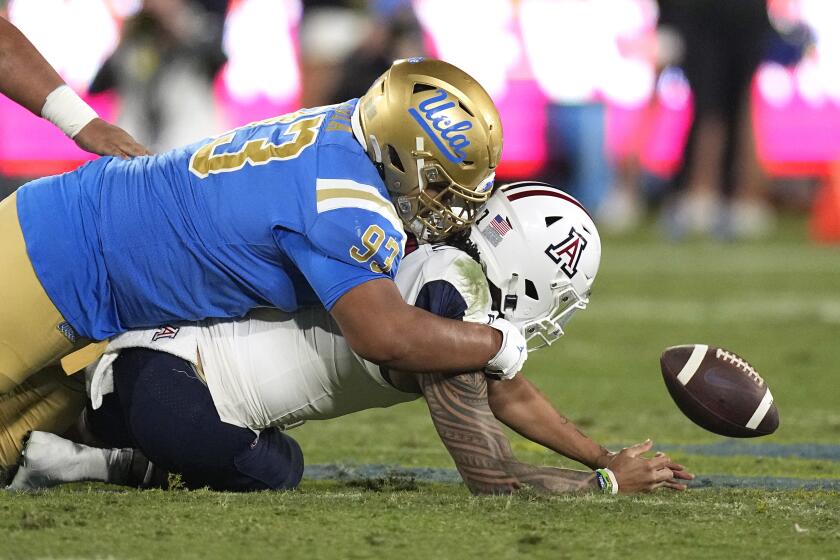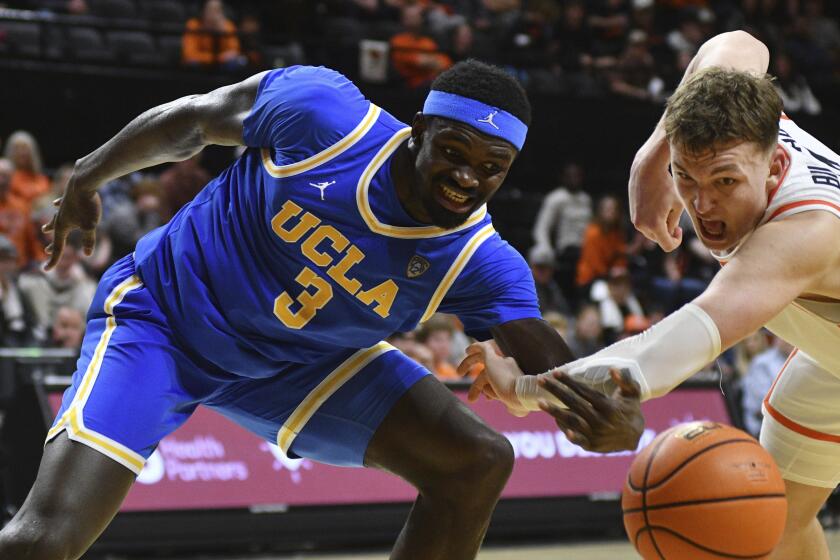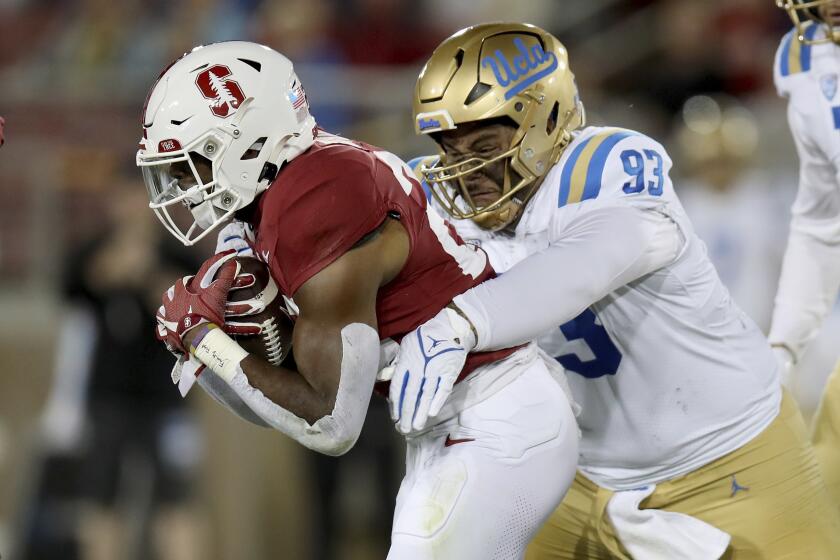Wildcats Are Still Top Dogs
There’s only one new coach in the Pacific 10 Conference who has taken a team to the Final Four, and it isn’t UCLA’s Ben Howland.
It’s Washington State’s Dick Bennett, who guided Wisconsin to the 2000 Final Four and has come out of retirement to take over a dismal program that has finished last in the league four of the last five years and hasn’t finished in the top three in the last 20.
Now Bennett is one of three Pac-10 coaches who have coached in the Final Four, joining Arizona’s Lute Olson and Stanford’s Mike Montgomery -- not that anyone is picking the Cougars to upset the balance of power in the league any time soon.
“It will be good coffee-break conversation, water-cooler talk,” Bennett said. “But they’re not scared. They don’t have anything to fear.”
Bennett is best remembered for one thing, coaching a team that scored only 41 points in that Final Four game, when the Badgers lost to Michigan State in a 2000 semifinal, 53-41.
The halftime score was 19-17 after Wisconsin held Michigan State without a field goal for the final 11:42 of the half to go in trailing by two.
It was a performance that was met with the kind of reaction you’d get for spitting on James Naismith’s grave.
“People talk about [Bennett] like he’s some kind of ogre or a monster or something,” Montgomery said, incredulous. “I have a lot of respect for him.”
Around the Pac-10, maybe Bennett should be better remembered for a couple of other games.
In 1994, when he was the coach at Wisconsin Green Bay, he engineered a first-round NCAA tournament upset of a California team that had Jason Kidd.
“I remember preparing all week,” Bennett said. “We set up a picket fence in front of Jason Kidd. We put a guy in his face and two guys in the gaps next to him to pinch. We said, ‘Someone else is going to beat us, but it’s not going to be Jason Kidd.’ ”
Kidd had 12 points, 11 rebounds and seven assists, but made only four of 17 shots and Wisconsin Green Bay won, 61-57.
Bennett had another Pac-10 upset as well, beating a top-seeded Arizona team that had Gilbert Arenas and Richard Jefferson, 66-59, in the second round the year Wisconsin went to the Final Four.
The grinding and physical defensive style Bennett is famous for is going to be an anomaly in the Pac-10 that will make the trip to Pullman seem even longer, though it probably won’t be much harder to win, at least at first.
“If he’s doing his job, it’s going to be no fun to play against them,” Montgomery said. “Any time somebody doesn’t allow you to do what you want to do, it’s frustrating.”
Washington State Athletic Director Jim Sterk’s lured Bennett, 60, back to the game three years after he retired citing burnout.
“I think it’s a great hire for Washington State, just based on the kind of kids they would probably generate there,” Montgomery said. “It’s no different than when I was at Montana. We got Montana kids, farm kids, tough kids. I would think that would be something they would generate, maybe a little bit more than an inner-city kid in the Palouse.”
Recruiting players to fit his system will be crucial. For now, Bennett can’t even get the best local kids. Two eastern Washington standouts recently signed with Gonzaga.
“It’ll be kind of gradual,” Bennett said. “It’s not one of those places where you’ll have these drop-dead athletes in one year just come. It will have to be very gradual where you get better and better and all of a sudden you’re there, kind of the way it happened at Wisconsin.
“I just want to be really hard to play,” he said. “I want to be hard to beat, and from there we’ll see. Maybe being hard to beat will enable us to win some games.”
A look at the Pac-10, in order of projected finish:
1. ARIZONA
Jason Gardner, Luke Walton and Rick Anderson are gone from the 28-4 team that spent much of last season ranked No. 1 but lost to Kansas in the West Regional final. But Arizona has so much young talent the Wildcats are ranked fourth in the nation. Guard Salim Stoudamire is a streaky but talented shooter, and the Wildcats have plenty of other standouts in center Channing Frye and sophomore perimeter players Hassan Adams and Andre Iguodala. Freshman Mustafa Shakur is supposed to be the next great point guard in the tradition of Damon Stoudamire, Mike Bibby, Jason Terry and Gardner.
2. STANFORD
If veteran leadership is still important, Stanford might be as good a pick as Arizona. With nine of the top 10 players back from a 24-9 team, the Cardinal is ranked 20th in the nation. Forward Justin Davis is poised for a big season, but there is concern about Josh Childress, who had 11 double-doubles last season but has a foot injury that could be the precursor to a stress fracture. Shooter Matt Lottich and center Rob Little are the other starters from a lineup that lost only Julius Barnes. A pivotal player is point guard Chris Hernandez, who missed most of last season after breaking his left foot twice. The foot is 100%, but Hernandez is playing with herniated disks in his back.
3. CALIFORNIA
Confidence in the Bears slipped after an opening 63-62 loss to Cal Poly last week, a game in which Cal blew a 14-point lead. The Bears lost Pac-10 scoring champion Joe Shipp and Brian Wethers from a 22-9 team, but smooth-passing big man Amit Tamir is back. Coach Ben Braun recruited one of the best freshmen in the nation in forward Leon Powe, who had a double-double in his debut. Sophomore forward Erik Bond and freshmen Ayinde Ubaka and Marquise Kately are other promising players.
4. OREGON
Luke Ridnour left early for the NBA after the Ducks’ 23-10 season. But Coach Ernie Kent says freshman Aaron Brooks is as good as Ridnour was when he was a freshman, comparing Brooks’ ability to push the ball upcourt to former UCLA star Tyus Edney’s. The other Luke, three-point shooting forward Luke Jackson, is back for his senior season, the only player in Oregon history to record two triple-doubles. Guards James Davis, who led the Pac-10 with 90 three-pointers, and Andre Joseph, should be able to help sustain the Ducks’ up-tempo, three-point oriented system, but they face a stiff early challenge in a Dec. 13 game against Kansas.
5. USC
The Trojans capped their 13-17 season with an impressive run to the Pac-10 tournament final, but they opened this season with an unimpressive loss to Western Michigan. Coach Henry Bibby has five starters back but signaled another unpredictable year by starting a lineup that included both Stewart twins, freshmen Lodrick and Rodrick, but neither of the junior Craven twins, Errick and Derrick. Guard Desmon Farmer is the second-leading returning scorer in the Pac-10 after averaging 18.7 points, trailing only Arizona State’s Ike Diogu.
6. UCLA
New Coach Ben Howland is bringing a more defense-oriented style and an emphasis on disciplined offense to Pauley Pavilion, but the Bruins have only the remnants of a 10-19 team. UCLA lost Jason Kapono, Ray Young and Andre Patterson and is without forward T.J. Cummings for at least the first three games because he is academically ineligible. That means the Bruins will face Kentucky without him in the Wooden Classic Dec. 6 in Anaheim. Freshman forward Trevor Ariza is a smooth perimeter player and might be the second scoring option behind swingman Dijon Thompson, but the Bruins face a difficult schedule with games against Michigan State, Michigan and Notre Dame in addition to Kentucky and the Pac-10.
7. ARIZONA STATE
The Sun Devils have the most unstoppable offensive force in the conference in Diogu, a 6-8, 250-pound sophomore who averaged 19 points and almost eight rebounds as a freshman. He has been chosen one of the five best players in the nation by Associated Press, but doesn’t appear to have enough of a supporting cast for the Sun Devils to make an impact in the conference. Coach Rob Evans’ team went 20-12 last season and reached the NCAA tournament for the first time since 1995, but Diogu and guard Jason Broxton are the only returning starters.
8. WASHINGTON
Lorenzo Romar calls this the quickest team he has had since he has been a head coach, including stops at Pepperdine and St. Louis. He has four starters back from a 10-17 team, with only one senior on the roster, guard Curtis Allen. Guard Will Conroy is the leading returning scorer, but sophomore guard Brandon Roy appears as if he might have a breakout season after scoring a career-high 22 points in a victory over UC Riverside last week.
9. WASHINGTON STATE
Bennett caught a break when high-scoring guard Marcus Moore decided to return to school after testing his draft prospects, particularly because some expected Moore would want nothing to do with Bennett’s defensive style. His numbers figure to suffer, but he averaged 16.7 points during the Cougars’ 2-1 start at the Top of the World Classic, where they lost to Rice in the title game. After averaging 70.6 points during a 7-20 season, the Cougars are down to 57.3 -- and more important, holding opponents to 53.7.
10. OREGON STATE
For the first time since the 1978-79 season, the Beavers don’t have a senior on the roster after losing their top three scorers from a 13-15 team. Oregon State won six Pac-10 games and finished tied for sixth in Coach Jay John’s first season, the school’s best finish since 1993. But the only returning starter is sophomore guard Lamar Hurd, who is the third-leading returning assist man in the Pac-10 after averaging 3.75 as a freshman.
Go beyond the scoreboard
Get the latest on L.A.'s teams in the daily Sports Report newsletter.
You may occasionally receive promotional content from the Los Angeles Times.



